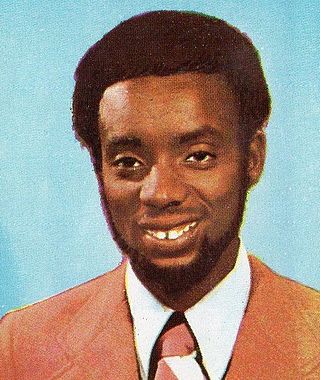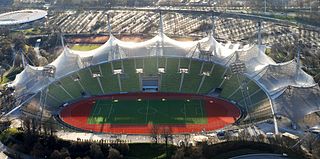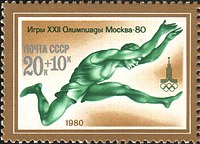
The men's high jump was one of four men's jumping events on the Athletics at the 1964 Summer Olympics program in Tokyo. Qualification was held on October 20, 1964, with the final on October 21. 29 athletes from 20 nations entered, with 1 not starting in the qualification round. The maximum number of athletes per nation had been set at 3 since the 1930 Olympic Congress. The event was won by Valeriy Brumel of the Soviet Union, the nation's second consecutive victory in the men's high jump. Brumel, who had earned silver in 1960, and American John Thomas, who had previously taken bronze in 1960 and now won silver, became the first two men to win multiple medals in the Olympic high jump. John Rambo, also of the United States, won bronze to complete the podium.

Nenad Stekić was a Serbian and Yugoslav long jumper, best known for his European record of 8.45 metres, second only to Bob Beamon's world record at the time.

The men's long jump at the 1988 Summer Olympics in Seoul, South Korea had a start list of 41 competitors from 31 nations, with two qualifying groups before the final (12) took place on Sunday September 25, 1988. The maximum number of athletes per nation had been set at 3 since the 1930 Olympic Congress.
The men's high jump competition at the 1988 Summer Olympics in Seoul, South Korea had an entry list of 27 competitors from 18 nations, with two qualifying groups before the final (16) took place on Sunday September 25, 1988. The maximum number of athletes per nation had been set at 3 since the 1930 Olympic Congress. There were two bronze medals awarded. The event was won by Hennadiy Avdyeyenko of the Soviet Union, the nation's first victory in the men's high jump since 1972 and fourth overall. Hollis Conway's silver returned the United States to the podium after a two-Games absence that had disrupted the American streak of medaling in every Olympic men's high jump. Patrik Sjöberg's bronze made Sweden the fourth nation to medal in two consecutive Games, after the United States, the Soviet Union, and France. The other bronze medal went to Rudolf Povarnitsyn of the Soviet Union after the countback could not break the tie for third.
The men's long jump was an athletics event at the 1996 Summer Olympics in Atlanta, Georgia, United States. There were 54 competitors from 41 nations, with one athlete not starting. The maximum number of athletes per nation had been set at 3 since the 1930 Olympic Congress. The event was won by Carl Lewis of the United States, the nation's fourth consecutive and 20th overall gold medal in the men's long jump. Lewis himself had won the four straight victories, becoming the third Olympian to win the same event four times in a row as well as the only man to win four long jump medals. It was the ninth and final Olympic gold of Lewis's career. James Beckford earned Jamaica's first medal in the event. Joe Greene matched his bronze from 1992, becoming the ninth two-medal winner in the event.
The men's long jump was an event at the 1992 Summer Olympics in Barcelona, Spain. There were 50 participating athletes from 37 nations, with two qualifying groups. The maximum number of athletes per nation had been set at 3 since the 1930 Olympic Congress. The event was won by Carl Lewis of the United States, the nation's third consecutive and 19th overall gold medal in the men's long jump. Lewis became the second man to win three medals in the event and the first to win three golds. Mike Powell repeated his silver-medal performance from 1988, becoming the eighth two-medal winner in the event. Joe Greene took bronze, completing the United States' second consecutive and fourth overall medal sweep in the men's long jump.
The final of the men's triple jump event at the 1992 Summer Olympics in Barcelona, Spain was held on August 3, 1992. There were 47 participating athletes from 32 nations, with two qualifying groups. The maximum number of athletes per nation had been set at 3 since the 1930 Olympic Congress. Mike Conley Sr. set a new Olympic record with 17.63 m. He also jumped 18.17 m which would also improve the standing world record, but this jump had wind assistance 2.1 m/s. The top twelve and ties, and all those reaching 17.00 metres advanced to the final. The qualification round was held on August 1, 1992. Conley's gold was the United States's fifth victory in the men's triple jump, surpassing the Soviet Union's four. Conley was the 11th man to win two medals in the event, and the first to do so in non-consecutive Games. Frank Rutherford's bronze was the first medal for the Bahamas in the event.
The men's high jump was an event at the 1992 Summer Olympics in Barcelona, Spain. There were 43 participating athletes from 27 nations. The maximum number of athletes per nation had been set at 3 since the 1930 Olympic Congress. The qualification mark was set at 2.29 metres. The event was won by Javier Sotomayor of Cuba, the nation's first victory in the men's high jump. Patrik Sjöberg of Sweden earned silver, becoming the first man to win a third medal in the event, though he never won gold. Sweden was only the third country to have three consecutive podium appearances. A three-way tie for third could not be resolved by countback, so bronze medals were awarded to Tim Forsyth, Artur Partyka, and Hollis Conway.
The men's triple jump event at the 1988 Summer Olympics in Seoul, South Korea had an entry list of 45 competitors, with 43 athletes from 31 nations starting in two qualifying groups before the final (12) took place on Saturday September 24, 1988. The maximum number of athletes per nation had been set at 3 since the 1930 Olympic Congress. The event was won by Khristo Markov of Bulgaria, the nation's first medal and victory in the men's triple jump. Igor Lapshin and Aleksandr Kovalenko of the Soviet Union took silver and bronze in an event where the Soviets had reached the podium eight consecutive Games before the 1984 boycott.

The men's triple jump event at the 1984 Summer Olympics in Los Angeles, California had an entry list of 28 competitors, with two qualifying groups before the final (12) took place on August 4, 1984. The maximum number of athletes per nation had been set at 3 since the 1930 Olympic Congress. The top twelve and ties, and all those reaching 16.60 metres advanced to the final. The event was won by Al Joyner of the United States, the nation's first title in the men's long jump since 1904 and fourth overall. Mike Conley Sr., also an American, took silver. Keith Connor's bronze was Great Britain's first medal in the event since 1908. The Soviet boycott broke that nation's four-Games gold medal and eight-Games podium streaks.

The men's long jump was an event at the 1984 Summer Olympics in Los Angeles, California, United States. There were 31 participating athletes from 25 nations, with two qualifying groups, and the final held on August 6, 1984. The maximum number of athletes per nation had been set at 3 since the 1930 Olympic Congress. The event was won by Carl Lewis of the United States, the nation's 17th gold medal in the event. It was Lewis's second gold of the Games as he tried (successfully) to match Jesse Owens's 1936 quadruple. It was also the first of Lewis's four consecutive gold medals in the long jump. Gary Honey gave Australia its first men's long jump medal since 1948; Giovanni Evangelisti won Italy's first-ever medal in the event.
The men's triple jump event at the 1980 Summer Olympics in Moscow, Soviet Union had an entry list of 23 competitors, with two qualifying groups before the final (12) took place on Friday, July 25, 1980. The maximum number of athletes per nation had been set at 3 since the 1930 Olympic Congress. The top twelve and ties, and all those reaching 16.55 metres advanced to the final. The qualification round was held on Thursday, July 24, 1980.

The men's long jump at the 2008 Olympic Games took place on 16 and 18 August at the Beijing Olympic Stadium. Thirty-eight athletes from 32 nations competed. The event was won by Irving Saladino of Panama, the nation's first Olympic gold medal in any event and its first medal the men's long jump. South Africa also won its first men's long jump medal, with Khotso Mokoena's silver. Ibrahim Camejo's bronze was Cuba's first medal in the event since 2000. This event marked the first time that an American did not classify to the final phase in a non-boycotted Olympic competition.
The men's long jump event at the 2000 Summer Olympics took place on Monday, 25 September, and Thursday, 28 September 2000, in Sydney, Australia. Fifty-three athletes from 38 nations competed. The maximum number of athletes per nation had been set at 3 since the 1930 Olympic Congress. The event was won by Iván Pedroso of Cuba, the nation's first medal and title in the men's long jump; it snapped a four-Games streak of American victories. Jai Taurima took silver, Australia's third silver in the event. Roman Shchurenko earned Ukraine's first medal in the men's long jump with his bronze. It was the first time the United States had competed in the event and not won at least a silver medal; the Americans had previously failed to place in the top two only at the boycotted 1980 Games.

The men's long jump was one of four men's jumping events on the Athletics at the 1968 Summer Olympics program in Mexico City. The long jump took place on 18 October 1968. Thirty-five athletes from 22 nations competed. The maximum number of athletes per nation had been set at 3 since the 1930 Olympic Congress.

The men's high jump event at the 1980 Summer Olympics in Moscow, Soviet Union had an entry list of 30 competitors from 19 nations. The maximum number of athletes per nation had been set at 3 since the 1930 Olympic Congress. The final was held on Friday 1 August 1980. The event was won by Gerd Wessig of East Germany, the first gold medal by a German athlete in the men's high jump. It was also the first time a world record in the high jump had been set at the Olympics. Jörg Freimuth took bronze, making East Germany the third nation to have two medalists in the event in the same Games. Defending champion Jacek Wszoła of Poland took silver, becoming the fourth man to win two high jump medals and matching Valeriy Brumel for best results at one gold and one silver. Through the 2016 Games, Wszoła, Brumel, and Javier Sotomayor remain the most successful Olympic men's high jumpers; no high jumper has won two gold medals, or one gold and two silvers. Due at least in part to the American-led boycott, the United States' streak of making the podium in every Olympic men's high jump event to date ended, though a strong field may have kept them out of the medals even if they had competed.

The men's high jump event at the 2000 Summer Olympics as part of the athletics program was held at the Olympic Stadium on Friday, 22 September and Sunday, 24 September. Thirty-five athletes from 24 nations competed. The maximum number of athletes per nation had been set at 3 since the 1930 Olympic Congress. The high jump has been ever present since the beginning of the modern Olympic Games in 1896. The event was won by Sergey Klyugin of Russia, the nation's first medal and victory in the men's high jump in the nation's first appearance after the breakup of the Soviet Union. Javier Sotomayor of Cuba was the eighth man to win a second medal in the event ; he joined Valeriy Brumel and Jacek Wszoła as the most successful Olympic high jumpers in history with a gold and a silver—despite missing the 1984 and 1988 Games due to boycott and being hampered by injury in 1996. Abderrahmane Hammad's bronze was Algeria's first medal in the men's high jump.

The men's long jump field event at the 1960 Olympic Games took place on September 2. Forty-nine athletes from 34 nations competed. The maximum number of athletes per nation had been set at 3 since the 1930 Olympic Congress. The event was won by Ralph Boston of the United States, the nation's eighth consecutive and 13th overall victory in the men's long jump. Igor Ter-Ovanesyan's bronze was the Soviet Union's first medal in the event.

The men's long jump event at the 1976 Summer Olympics in Montreal, Quebec, Canada, had an entry list of 33 competitors from 25 nations, with two qualifying groups before the final (12) took place on Thursday July 29, 1976. The maximum number of athletes per nation had been set at 3 since the 1930 Olympic Congress. The top twelve and ties, and all those reaching 7.80 metres advanced to the final. The qualification round was held in Wednesday July 28, 1976. The event was won by Arnie Robinson of the United States, the nation's third consecutive and 16th overall gold medal in the men's long jump. Randy Williams took silver, but the chance of an American sweep was eliminated when Larry Myricks broke his foot warming up for the final. Robinson and Williams became the fifth and sixth men to earn two medals in the event. Frank Wartenberg of East Germany took bronze.

The men's long jump event at the 1972 Summer Olympics in Munich was held on 8 & 9 of September. Thirty-six athletes from 25 nations competed. The maximum number of athletes per nation had been set at 3 since the 1930 Olympic Congress. The event was won by Randy Williams of the United States, the nation's second consecutive and 15th overall gold medal in the men's long jump. Hans Baumgartner earned West Germany's first medal in the event.












